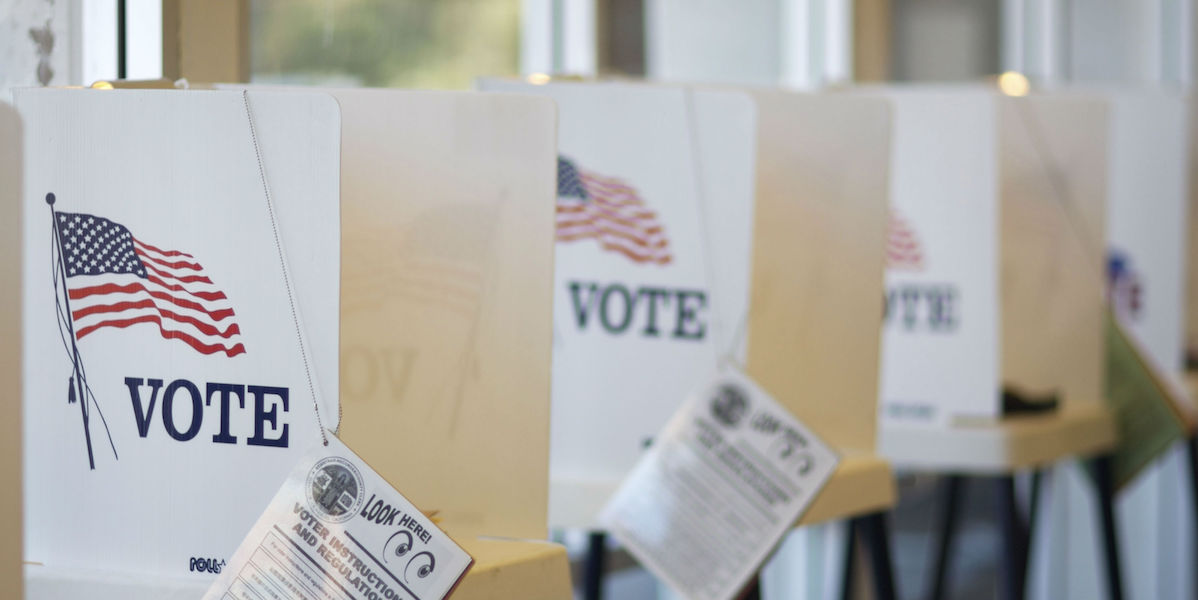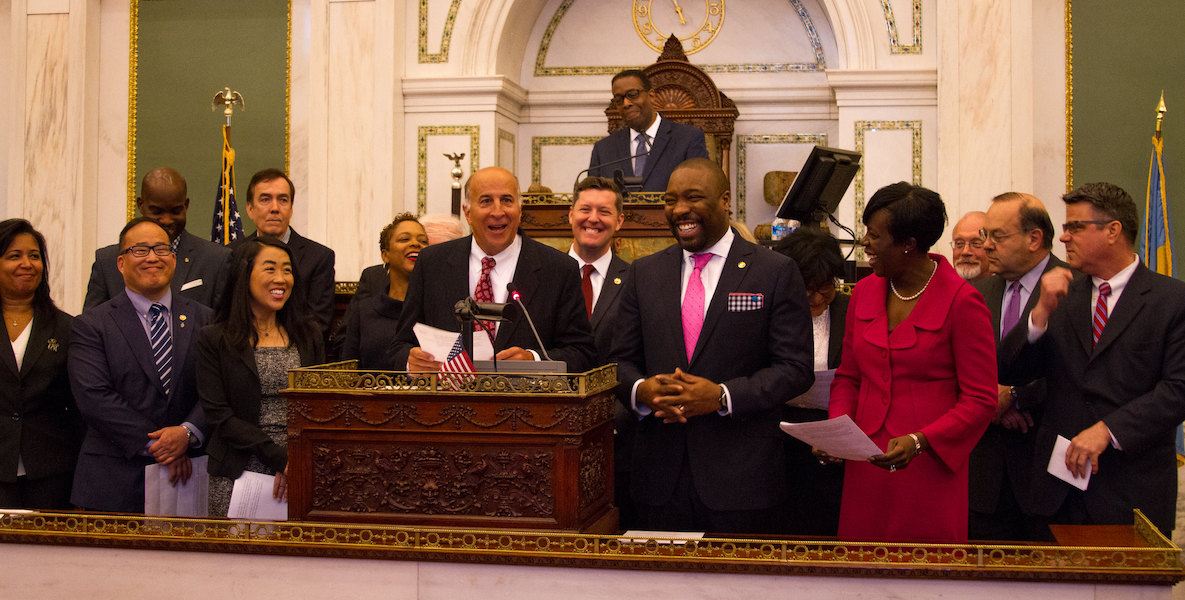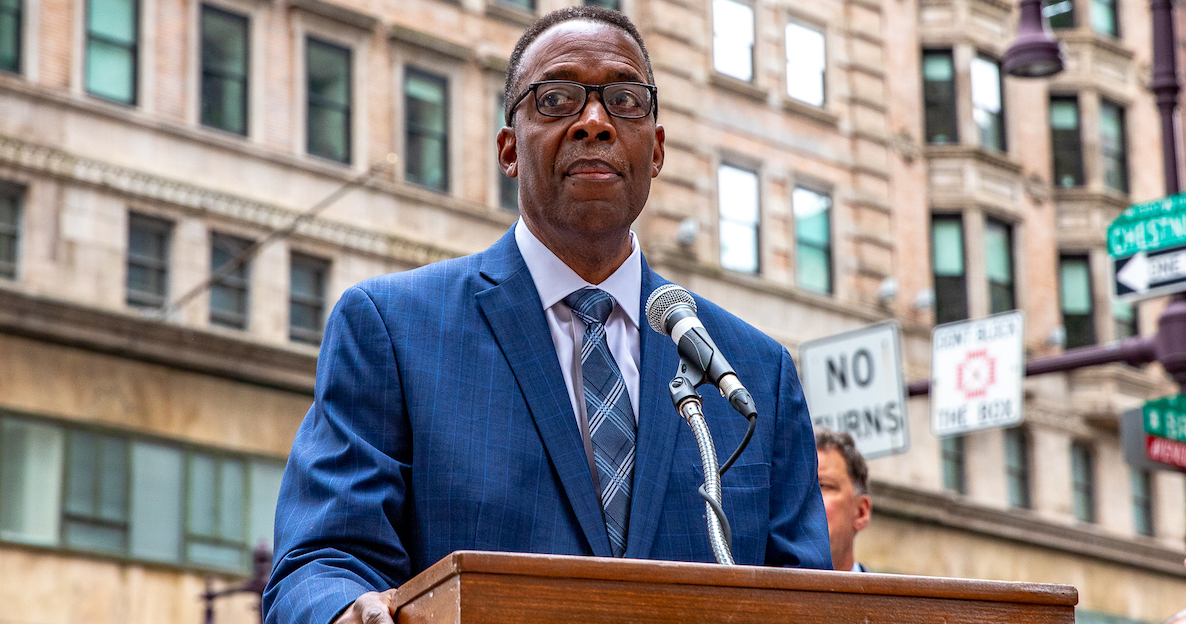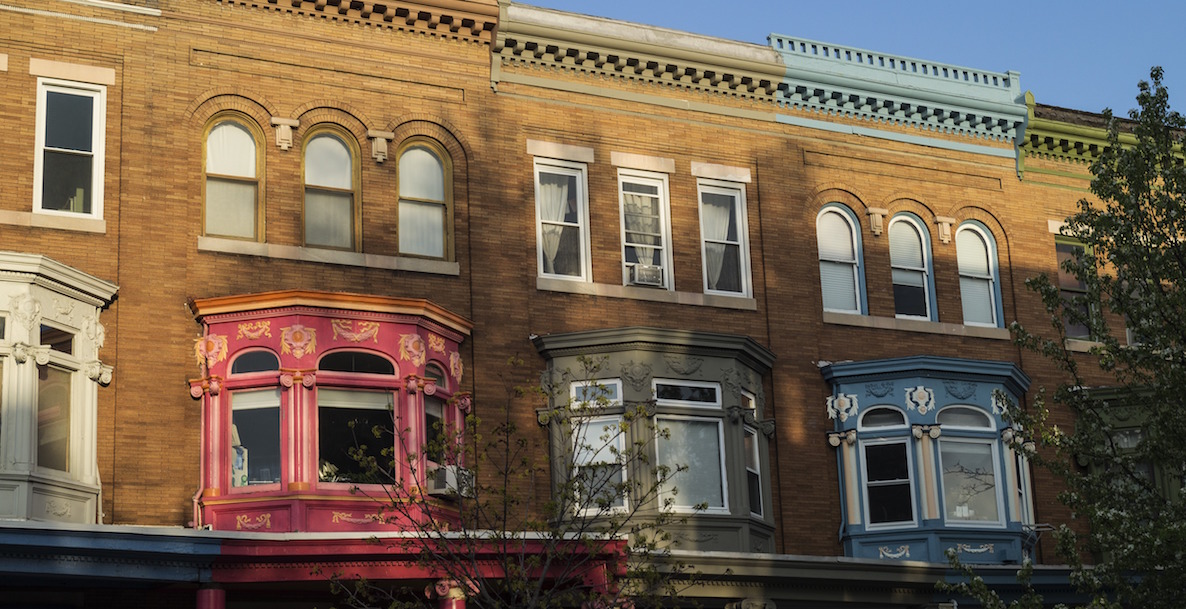With a new City Council taking office in January, Council’s legislative agenda gets a fresh start too, with the expiration of all bills that aren’t passed in December.
Council isn’t finished yet for the year, though, and last Thursday was the last day it would have been possible for anybody to introduce new legislation this year. Now the clock’s ticking for all the existing bills introduced in the 2015-2019 session, and unless some of these get a last-minute boost, they’ll either disappear or they’ll have to be reintroduced in the new term.
The list of all the bills is long, so we’ve compiled a list of some of the more significant bills, or groupings of bills, that are becoming less and less likely to make the cut this term.
One quick note on the process: in addition to the calendar, another parameter driving the plot is Council rules requiring five days’ notice before a hearing for non-zoning bills and 15 days’ notice for zoning bills. With a limited number of scheduled sessions in December, there isn’t any room for delay—especially for the tranche of eight zoning remapping bills 3rd District Councilmember Jannie Blackwell tossed into the mix last week.
In order to pass, those bills will need to be scheduled for a hearing on Wednesday, December 4th so they can get a first reading December 5th, and a vote for final passage on December 12th. They would be subject to pocket veto by Mayor Kenney if he declined to sign them—justifiably, since there was no time for constituents and affected property owners to review most of them—unless Council President Darrell Clarke were to take the extraordinary step of adding an extra session day on December 22nd or later to force the Mayor to act on them, and return them to Council signed, unsigned, or expressly vetoed. It’s not out of the question, given that this is Blackwell’s last term, but it would also be pretty extreme.
Election and Political Reform
A few big election and political reform bills were debated this term that failed to make it all the way, but some of them could conceivably come back in the future.
Public Financing and Cycle Limits
Derek Green had introduced a bill establishing a public financing system for municipal elections, along with some other changes to campaign finance, with cycle limits for fundraising being the most significant. We’ve written previously about how cycle limits could go a long way toward watering down a key incumbency advantage. Under the current system of annual fundraising limits, incumbents have four years to fundraise for the next election, while most challengers realistically have two at most.
Council Term Limits
Allan Domb introduced a bill establishing City Council term limits for the first time, which would also have a positive impact on turnover and political competition in a legislature where incumbents unfortunately tend to treat their service as a lifetime appointment. Term limits opponents outnumbered supporters in this Council, but a few more supporters got elected this year for a net shift in support in favor of term limits. It’s too early to tell whether it’ll have the votes to pass yet, but it seems more likely we’ll get an earnest debate about the idea in the next term.
School Board Elections
David Oh, objectively speaking, is not very good at getting legislation passed. But during this term he introduced a bill to establish School Board elections, and that seems like an idea that could have legs in the future, if not in this term. After the state-controlled School Reform Commission was disbanded, Mayor Kenney appointed the first round of School Board appointees, though in the future, City Council will have confirmation power over any replacements. Teachers’ unions tend to like school board elections because they’re the most organized constituency in this space, and would be best-positioned politically to field and support candidates aligned with their goals. So while David Oh may not be the perfect vessel for this bill, it’s possible it could get taken up by somebody more influential.

Housing and Zoning
Abatement Bonanza
There are currently seven 10-year tax abatement reform bills sitting in Council. Several are from Helen Gym, put forth as a menu of options for different changes, including a bill to have the abatement phase out each year over 10 years, and a full elimination bill proposed by Cindy Bass, which was co-sponsored by Gym. There is (of course) even a total non sequitur of a bill from Bobby Henon and Al Taubenberger limiting the abatement to licensed contractors as a tactical move by the building trades to try and freeze out non-union contractors.
None of these bills so much as got a hearing in this term, but as Jake Blumgart reported this week, there was going to be a last-minute push with two new bills that would impact only the abatement for residential improvements: a 10-year wind-down bill that would phase out the abated amount by 10 percent in each year, and a bill that would cap the per-unit subsidy at a yet-unspecified amount. Thursday it was reported that the cap bill has been scrapped, and only the wind-down bill is moving forward.
It’s worth noting that the wind-down and cap ideas are already in a few of the existing bills, although there are some important differences between the old and new legislation. Helen Gym’s wind-down bill, which was introduced in January, follows the same 10-year calendar as Clarke’s bill. Unlike Thursday’s entrant, however, it applies to both residential and commercial/industrial properties; the bill introduced last week is limited to residential only.
Additionally, the new wind-down bill requires an impact analysis every three years. These differences could have been resolved by amending Gym’s bill; however it is likely that the Council President wanted to make broad Council support for the wind-down concept explicit, a goal which was (partially) accomplished by introducing new legislation with all members named as co-sponsors.
Community Benefit Agreements
Another Clarke bill that may run out of time is the push to require Community Benefits Agreements for certain high-impact development projects that receive city support or financial assistance. The cases where this would apply in the current draft are extremely broad, where “city support” can even refer to rezoning, or “high-impact” status can turn on “social” or “aesthetic” impacts on the surrounding community—fuzzy concepts that introduce a lot of Council discretion into the mix. It’s easy to imagine this incentivizing Councilmembers to rezone land inappropriately, and then extract concessions for more appropriate zoning.
Zoning Reform Backlash
The other big land use-related initiatives that seem the most dead are the Zoning Code Review Commission supported by Darrell Clarke and Brian O’Neill, and Jannie Blackwell’s bill to double minimum parking requirements in some zoning districts. We’ve already written the obituary for the latter bill, and the former also hasn’t gone anywhere.
The Zoning Code Review Commission resolution was passed right before the May primary, and appeared designed to smuggle through a number of Clarke and O’Neill’s worst zoning ideas, generally aiming to limit multi-family housing and jam a lot more off-street parking into rowhome neighborhoods. The resolution established a Council-controlled Commission that was supposed to meet over the summer and issue recommendations six months later, which would have been around mid-October. In reality, what happened was they never appointed all of the Commission members, the Commission never met, and they never issued any recommendations. As it stands, the first bill to come out of the Commission would need to be introduced after January, and in the next Council term, the vote math gets much harder for Clarke and O’Neill’s suburban zoning dreams.

Transportation
Local Control of the PPA
Back in 2016, David Oh introduced a bill aimed at reclaiming local control of the Philadelphia Parking Authority from the state by essentially stripping it for parts. The bill would have reassigned many of the Authority’s functions to the Streets Department the Police—a good idea on the merits—but which ultimately wouldn’t fix the state revenue formula or the unaccountable governance problem. Just as one example, Tom Wolf has been Governor for five years now, and he still won’t get to make his first appointment to the Parking Authority board until 2022. The Parking Authority is known as a patronage mill for the city Republican Party and this is one of the biggest sources of its dwindling political power locally. The local Democratic Party is in on the action too, from the times predating when state Republicans took it over, which could explain some of the lack of enthusiasm for the bill from City Council Democrats. The bill didn’t go anywhere after the initial introduction, but Oh could be motivated to reintroduce it again next year after prevailing over the ‘PPA guys’ who were working against him in the election.
Electric Vehicle Charging Infrastructure
Ever since a few Society Hill neighbors essentially killed the whole city’s electric vehicle charging program—where people used to be able to pay to get electric chargers installed in a dedicated parking space—Philadelphia has been left without a real plan for scaling up EV charging infrastructure. David Oh, who supported ending the curbside program, came back with an idea for a Parking Tax cut for parking garage and lot owners who would install the charging infrastructure, taking their rates down from 22 percent to 18 percent. This didn’t go anywhere and the whole issue seems to have completely fallen off of Council’s agenda.

Environment
Plastic Bag Ban
Mark Squilla’s plastic bag ban bill is one of the bigger agenda items still unresolved as we approach the end of the year. One of the big remaining issues revolves around whether or not to include a fee on other types of bags, which was opposed by some businesses. The fee was removed in the latest iteration of the bill, which then lost it support from several environmental groups like PennEnvironment, who argued that the removal of the fee would lead retailers to use thicker varieties of plastic bags that would not be banned. The situation appears fluid, and it’s unclear if it’ll be resolved before the end of the session. More self-identified environmentalist candidates will be on Council in the next term, so the odds of this coming back again next term in the event this doesn’t pass seem pretty good.

Taxes
There are several tax bills still lingering in Council, one of which seems likely to pass, and several that seem more likely to stall out.
Wage Tax Credit for Low-Wage Workers
Allan Domb’s push for a low-income wage tax credit made it out of Council’s Finance Committee last week, which could put it on track to pass the full Council soon. Mayor Kenney has opposed the bill, estimating it could cost as much as $25 million, and calling for Council to reconsider it during next year’s budget process instead. The city wage tax is currently 3.8712 percent for residents and 3.4481 percent for nonresidents and is the largest source of city revenue, raising around $2 billion per year.
Eligibility would be determined by the income levels set for the state’s tax forgiveness program. For context, a family of two adults and two children, would qualify if they earn up to $34,250 per year, and single parents of two children would qualify if they earn up to $27,750 a year. The legislation would reduce the wage tax rate to 1.5 percent for eligible workers, and they would start to receive refunds beginning in 2023, when the 1.5 percent portion of the PICA tax is scheduled to end.
This being politics, Domb won’t get any credit from the more ideological corners of the left for introducing and passing this bill, which is too bad because it’s been a significant part of the local progressive tax agenda for a few decades, and it was Domb who ultimately made it a priority to get it done.
This is a big deal, and it’s an idea that had been kicking around city progressive circles for a while as a kind of roundabout way of doing progressive taxation that wouldn’t run afoul of the state Constitution’s uniformity clause, which has been interpreted to require flat taxes.
Originally championed by the late Councilmember David Cohen, and passed into law, the tax credit was never implemented and then was repealed by Council in 2012. This being politics, Domb won’t get any credit from the more ideological corners of the left for introducing and passing this bill, which is too bad because it’s been a significant part of the local progressive tax agenda for a few decades, and it was Domb who ultimately made it a priority to get it done. Fans of this approach will say it doesn’t go far enough, which is fair enough, but it’s also the most progress anybody’s made to advance the concept in almost eight years, and as the Homestead Exemption example shows, it’s easy to get Council to keep voting for bigger low and middle-income tax cuts once there’s a vehicle in place.
Faster Wage Tax Reductions
At the beginning of 2016, David Oh also introduced a bill that would accelerate planned wage tax reductions for all wage tax payers, but without replacement revenues identified, the bill did not advance.
Tax Lien Sales
Allan Domb looks unlikely to achieve one of his top first-term priorities, which was to have the city sell tax liens with the aim of increasing delinquent tax collections. Philadelphia has an unusually high rate of property tax delinquency and many believe city government simply isn’t trying as hard as it could to go after the money. A now-outdated 2013 analysis by PlanPhilly and the Inquirer found that most of this money was owed by investment properties rather than owner-occupied homes, suggesting the possibility of a more aggressive strategy focused on recouping money owed by more well-to-do investors and landlords, and a more careful strategy for dealing with homeowners who may have fallen behind due to precarious financial situations.
The bill addressed several of the common criticisms of tax lien sales and sought to avoid some of the mistakes Mayor Rendell made when he tried this, but Domb never fully convinced some members it wasn’t going to create problems in their districts. The solution to this that was kicking around for a while was to pass some carve-outs for properties in Jannie Blackwell, Darrell Clarke, and Maria Quinones-Sanchez’s districts, but for whatever reason the whole initiative stalled out, and there’s little sign that it will be resurrected in the final weeks of this term.
Actual Value Initiative Backlash
The last big category of tax-related bills that probably won’t be addressed in this term concerns real estate tax assessments. David Oh had a terrifyingly bad bill that would require City Council approval of the Office of Property Assessment’s assessment numbers, practically ensuring that the numbers would never be updated. Nobody can tell the difference between updating assessments to reflect market values and voting to raise taxes, and voters certainly wouldn’t distinguish between the two, so the politics would be exactly the same as for a vote to increase property taxes. In reality, the assessment process is just supposed to be about marking assessed values to market values to keep everything current—the whole point of the Actual Value Initiative.
You can simultaneously believe that OPA still has a lot of work to do to fine-tune their assessment methodology, and that inserting more Council grandstanding and cheap populism into the situation won’t make anything better. That bill is thankfully going nowhere, and neither is Maria Quinones-Sanchez’s bizarre War on Comps that would distort OPA’s assessment methodology even further in the wrong direction, and destroy any pretense of market-based assessments.
Things are moving fast as the end of the session approaches, so it’s definitely possible and even likely that this piece could very quickly become out of date. We’ll post updates if Council ends up passing any of the bills mentioned.
Jon Geeting is the director of engagement at Philadelphia 3.0, a political action committee that supports efforts to reform and modernize City Hall. This is part of a series of articles running in both The Citizen and 3.0’s blog.
Header: Jared Piper, via PHL City Council Flickr













